- / HOME
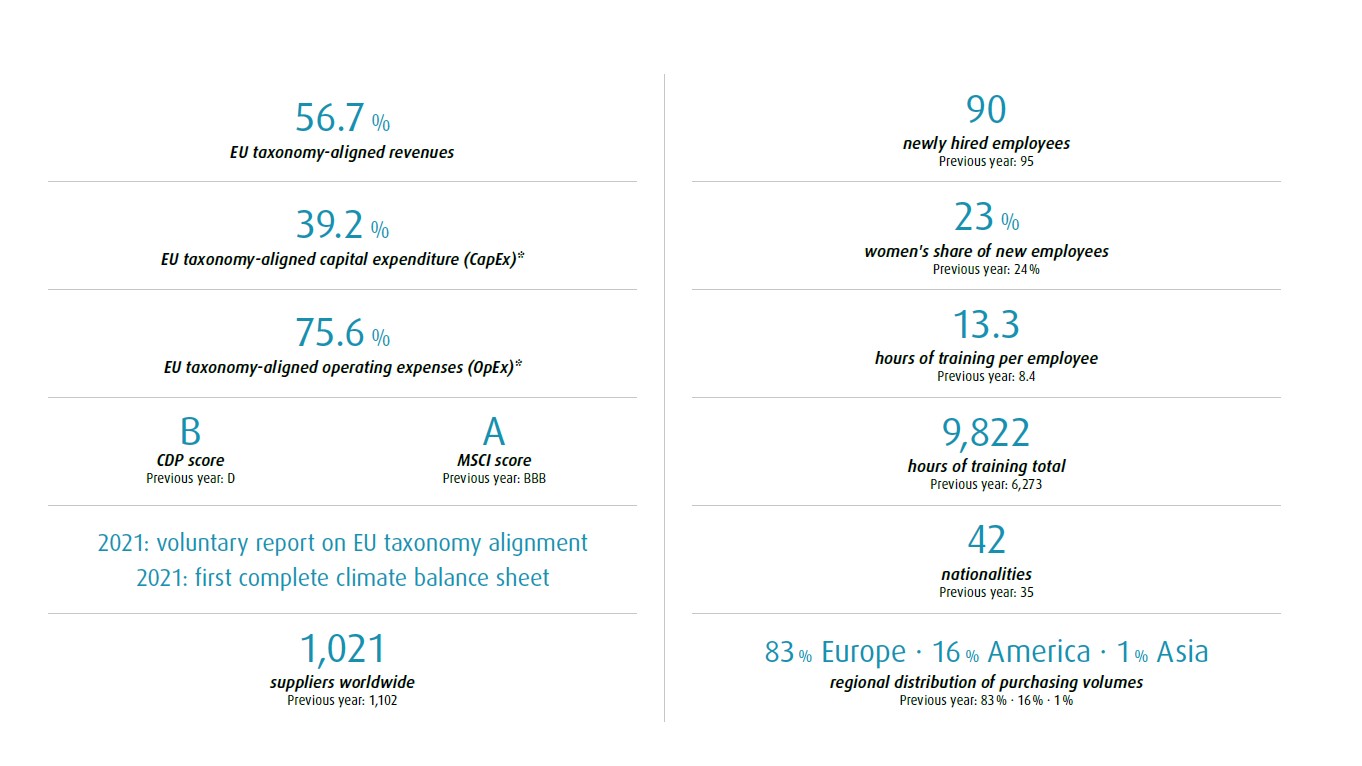
* As defined in the EU Taxonomy Regulation
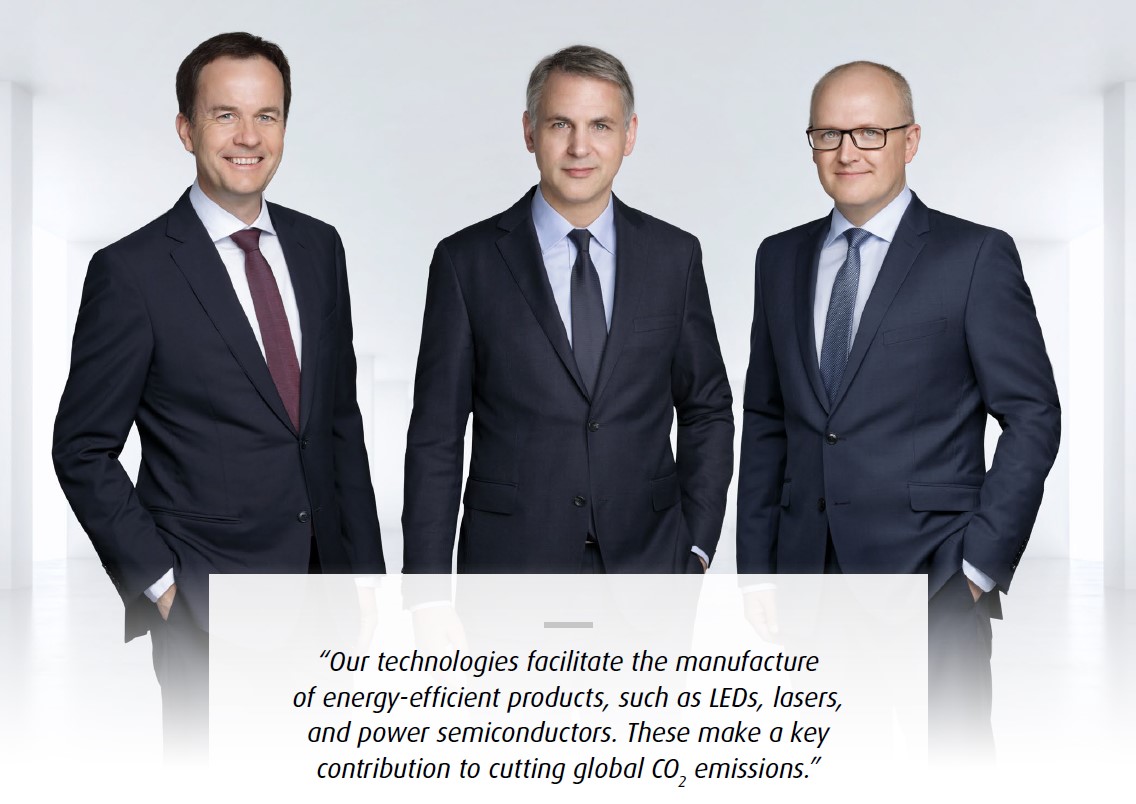
2021 was a great year for AIXTRON, and by no means just in financial terms. We also made further major advances in our Sustainability & ESG ( Environmental, Social, Governance) activities.
We report, for example, on the taxonomy alignment of our business activities in line with the EU’s new Taxonomy Regulation already for 2021 on a voluntary basis. With taxonomy-aligned revenues of EUR 243 million (56.7 %), most of our business is today already environmentally sustainable according to the definition of the Taxonomy Regulation.
In our core business of equipment technologies for compound semiconductors we are continuing to invest considerable sums in research and development. This way, we intend to completely renew our equipment portfolio and, by significantly differentiating our products, maintain our strong market position in future as well, and extend this even further in some segments. At AIXTRON, operating expenses (OpEx)* as defined in the EU Taxonomy Regulation correspond to the company’s R&D expenses. It is particularly pleasing to note the very high level of taxonomy-aligned operating expenses (OpEx)*, which stood at EUR 43 million (75.6 %). We were also able to report a high share of taxonomy-aligned capital expenditures (CapEx)*, in this case EUR 8 million (39.2 %). These high figures for the two key figures of OpEx* and CapEx*, which are especially relevant for the future development of the company, provide very impressive evidence for the sustainability of our investment strategy, particularly in the field of research and development. They give us grounds to expect a further rise in our environmentally sustainable revenues in the years ahead once the new technologies reach broad application.
These technologies relate in particular to wide band gap (WBG) power semiconductors based on gallium nitride (GaN) and silicon carbide (SiC), which are a key to energy-efficient power electronics of the future, as well as to Micro LEDs for next generation displays, laser diodes for data communications as a key technology to digitalize our world, and further exciting technologies in renewable energies (e. g. solar cells) and the promising field of quantum technology.
All these technologies have one thing in common: Compared with the technologies currently available on the market, they are far more energy efficient and thus make a substantial contribution to reducing greenhouse gas emissions. Alongside numerous further benefits resulting from their specific applications, these technologies play a considerable role in helping to mitigate climate change.
We have also become ever more successful in communicating the advances we have made in our ESG performance to the outside world. In fiscal year 2021, we managed to significantly improve our ESG ratings. Our CDP rating rose from D to B, while MSCI raised our rating from BBB to A.
We are also making continuous efforts to further reduce those CO2 emissions we can directly influence. We achieved climate neutrality in fiscal year 2019. In fiscal year 2021, we were able to compile a complete climate balance sheet for the first time. This means we are even better able to identify further potential for reducing CO2 emissions throughout the value chain.
By implementing various energy-saving projects, we managed to reduce our electricity consumption by 6.7 % to 10,883,534 kWh in 2021 (2020: 11,672,526 kWh), while our revenues over the same period rose by 59 %. Our overall energy requirements showed a slight increase of 2.9 % in 2021. That was mainly due to a greater need for natural gas and heating which, at 3,452,892 kWh in total, rose significantly compared with 2020 (2,258,854 kWh).
The main reason for this increase was that, due to coronavirus protection measures, the fresh-air share of overall ventilation systems had to be raised from 10 % to 50 %. Not only that: Due to the high level of humidity resulting from weather conditions in the past year, the heat registers used to dehumidify the air had to be operated far more often than usual.
Our employees are the key to our company’s success. Their creativity and problem-solving capabilities, their commitment and the outstanding dedication shown by our teams form the foundation of AIXTRON as a company. And AIXTRON’s team is growing rapidly. In 2021, 90 new employees joined us (2020: 95), of which 23 % women (2020: 24 %), and we expect continued strong growth in the years ahead. One particular hope is that we will be able to inspire and recruit even more women in future, especially for the more technical departments at our company. Our growing diversity and international focus are also reflected in the number of nationalities represented in our workforce, which has now risen to 42 (2020: 35).
One enormously important factor for us is to ensure a high level of further training for our employees. We therefore set ourselves the target of significantly increasing the number of training hours. We clearly succeeded here, with 13.3 hours of training per employee in 2021 compared with 8.4 hours in 2020.
Given our company’s strong growth, we also attach great priority to carefully and responsibly cultivating our strong and AIXTRON-specific corporate culture. Another important aspect is our commitment to society in the regions in which we operate. With our welfare and social activities, we support initiatives and organization that improve people’s lives. In summer 2021, for example, we made a donation of EUR 50,000 to provide speedy and uncomplicated assistance to victims of the flood disaster in AIXTRON’s direct vicinity.
Effective and efficient corporate governance forms the basis and provides the framework for our financial and non-financial success. Our highly developed corporate governance systems have been in place for many years now and act as the foundation for high-quality governance. Details can be found in the further comments in this report and in our Annual Report.
In this Sustainability Report, we offer you an overview of our sustainability strategy and its specific implementation. We would like to show you what we have achieved and the areas we will be working on today and in future.
The Executive Board of AIXTRON SE
| Dr. Felix J. Grawert |
Dr. Jochen Linck | Dr. Christian Danninger |
| Chief Executive Officer | Executive Board member | Executive Board member |
In this Sustainability Report, AIXTRON documents its ecological and social performance
and the progress it made in implementing its sustainability targets in the 2021 year under report. The report is intended to illustrate to our stakeholders how these ecological and social targets and measures have contributed to our company’s performance.
AIXTRON’s economic disclosures and performance for fiscal year 2021 can be found in our Annual Report.
The reporting period corresponds to fiscal year 2021, i.e. to the period from January 1, 2021 to December 31, 2021.
The report covers the following AIXTRON Group sites and subsidiaries. These mainly include:
As of December 31, 2021, AIXTRON had one manufacturing facility and R&D site in Herzogenrath and one in Cambridge (UK), as well as sales and service offices in Asia and the USA. The overwhelming majority of our employees work at our manufacturing site in Germany, while a significantly smaller number works in the UK. Our reporting therefore focuses on these two locations.
We refer above all to the more detailed disclosures on aspects such as the structure and management of the company provided in the Chapters One and Two of the current Annual Report of the AIXTRON Group.
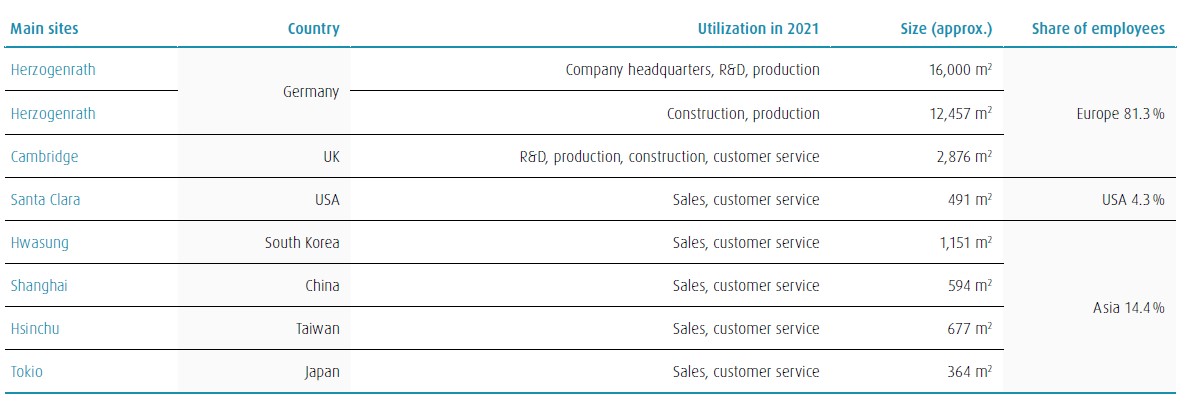
Overview of sites by country, including utilization, size and regional distribution of employees
We refer throughout this report to employees. This naturally refers to employees of all genders. The same applies to similar concepts, such as staff, participants, representatives, etc.a
This Sustainability Report has been prepared in accordance with “Core” option of the Sustainability Reporting Standards of the Global Reporting Initiative (GRI). The table at the end of the report provides information on the allocation of contents to the GRI framework requirements. You can find explanations accompanying the information and projects presented in this report on AIXTRON’s website (under “Sustainability”).
We are continuing in our endeavors to provide our stakeholders with as comprehensive a picture as possible of the non-financial aspects and key figures relating to our business activities. Individual key figures were recorded for the first time in the 2021 year under report and have been included in this report. If, in individual cases, no data for previous years is available to us, then it is not possible to compare these key figures with previous years. Where applicable, this circumstance is indicated accordingly.
The requirements of the German CSR Directive Implementing Act (CSR-RUG) oblige AIXTRON to publish a Non-Financial Declaration. With our separate Non-Financial Declaration, we meet the requirements incumbent on us pursuant to § 315b (1) to (3) of the German Commercial Code (HGB).
All text passages, tables, and charts in the Sustainability Report that are allocated to the Non-Financial Declaration are indicated by the letter omega Ω . For this purpose, GRI-based materiality was “mapped” onto HGB-based materiality. As a result, not all of the disclosures made in this report are necessarily part of the separate Non-Financial Declaration. References to disclosures made in the Management Report form part of the Non-Financial Declaration.
We are obliged pursuant to § 289c (3) HGB to review topics in respect of “double materiality”. This requires disclosures to be made on non-financial aspects if two criteria are met:
We reviewed the topics identified in respect of their “double materiality”. The topics meeting this definition are indicated within the report by the letter omega Ω . These topics are linked to the respective chapters in this report. We have not identified any “material risks” which have or will have “very probable severe negative implications” – consistent with the definitions provided in § 289c (2) and (3) and § 315c HGB – in connection with our own business activities or our business relationships, products and services.
The non-financial disclosures and key figures on our sustainability activities presented in this report were subject to an independent limited assurance audit by Deloitte GmbH Wirtschaftsprüfungsgesellschaft, Düsseldorf (Germany) with due application of the audit standard applicable to sustainability reporting (ISAE 3000 Revised).n.
We cultivate trust-based, long-term partnerships with our stakeholders. Like in our dealings with each other within the company, in these relationships we accord priority to treating each other as partners, with respect, and on a constructive basis. We see ourselves as part of the society we live in. In view of this, we are committed to social and welfare projects, particularly in the region surrounding our headquarters.
We act prudently, responsibly and with due consideration of the interests of all our stakeholders in all our business transactions. Our aim is to help build a long-term, permanent and sustainable future for our company, our customers, and society as whole. We can only achieve this goal by pooling our forces, working in a wide variety of partnerships and cooperations, and maintaining an ongoing dialog with our stakeholders.
Rainer Goeckel · Sustainability Manager
By maintaining a dialog, we endeavor to understand the perspectives of our stakeholders, build trust, and intensify existing partnerships. This helps us to recognize which steps are possible and necessary and which steps are expected of us. At the same time, this dialog allows the company to present the scope it sees for acting on social and environmental concerns, as well as to show which requirements and conditions are important for us.
AIXTRON’s material stakeholder groups are:
Identifying the most important stakeholders and their interests is crucial for any successful stakeholder dialog (cf. Sustainable corporate management and sustainability strategy / determination of material topics). Stakeholders are categorized
and prioritized by reference to the following criteria:
We regularly review and make any necessary adjustments to the process of identifying key stakeholders and relevant topics.
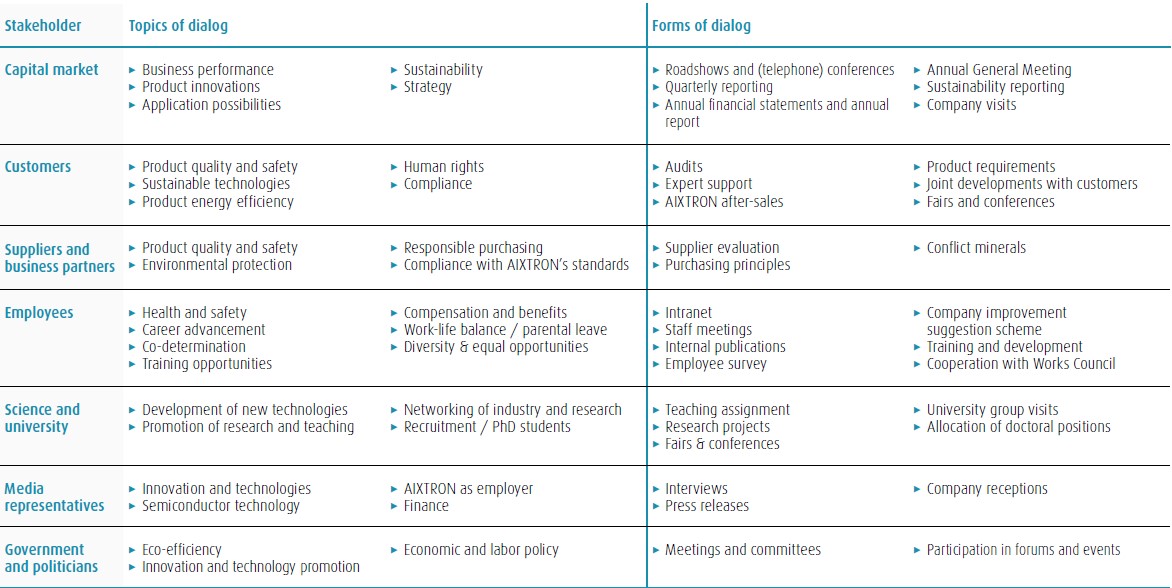
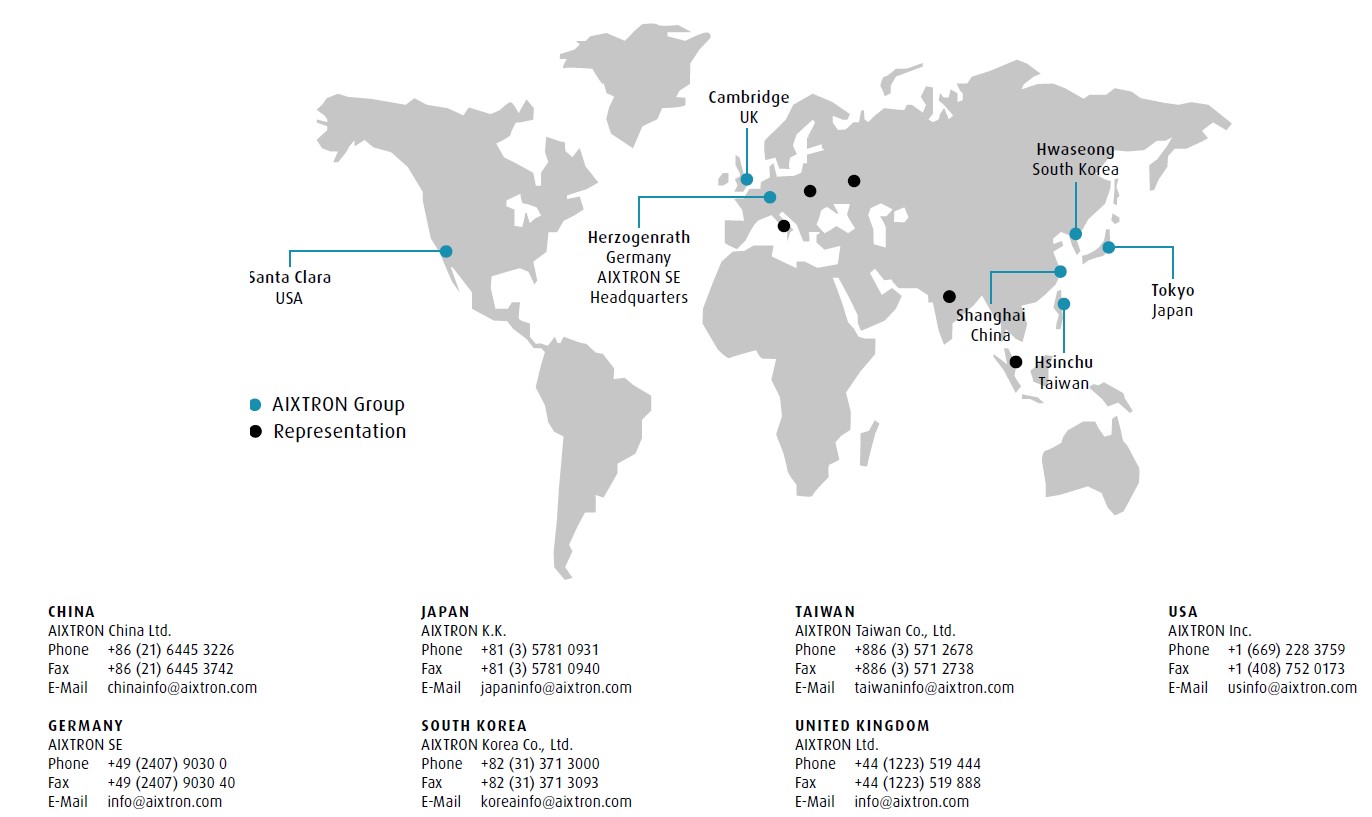
Alan Tai
Taiwan/Singapore
Christof Sommerhalter
USA
Christian Geng
Europe
Hisatoshi Hagiwara
Japan
Nam Kyu Lee
South Korea
Wei (William) Song
China
AIXTRON SE (Headquarters)
AIXTRON 24/7 Technical Support Line
AIXTRON Europe
AIXTRON Ltd (UK)
AIXTRON K.K. (Japan)
AIXTRON Korea Co., Ltd.
AIXTRON Taiwan Co., Ltd. (Main Office)
AIXTRON Inc. (USA)
Christoph Pütz
Senior Manager ESG & Sustainability
Christian Ludwig
Vice President Investor Relations & Corporate Communications
Ralf Penner
Senior IR Manager
Christian Ludwig
Vice President Investor Relations & Corporate Communications
Prof. Dr. Michael Heuken
Vice President Advanced Technologies